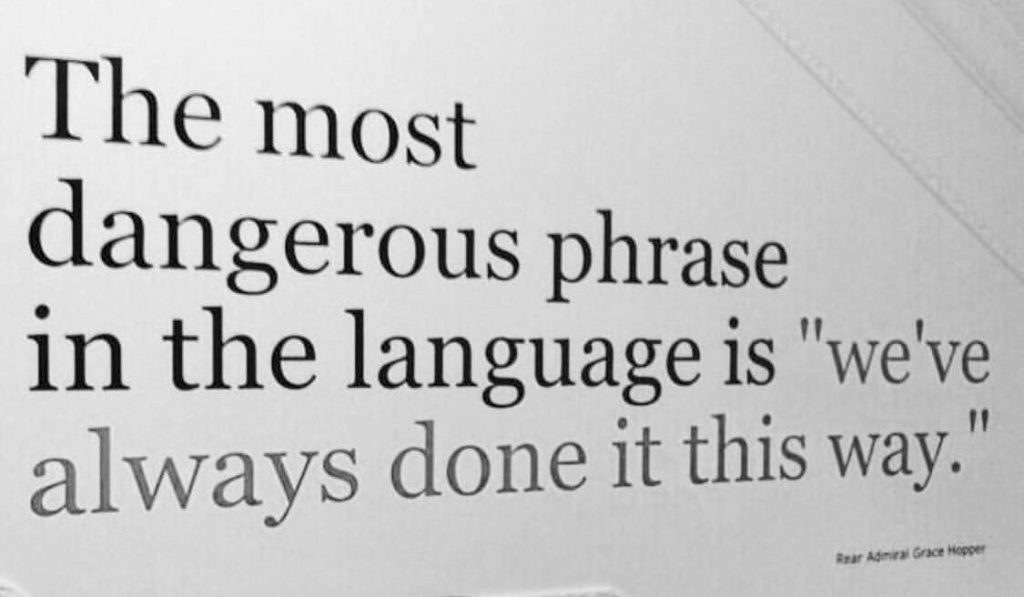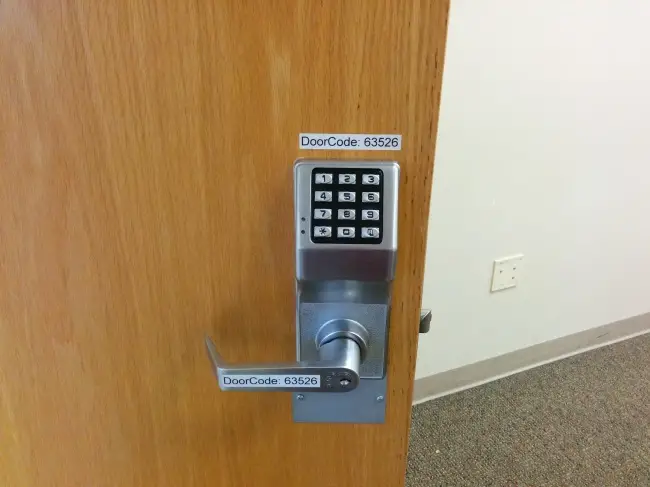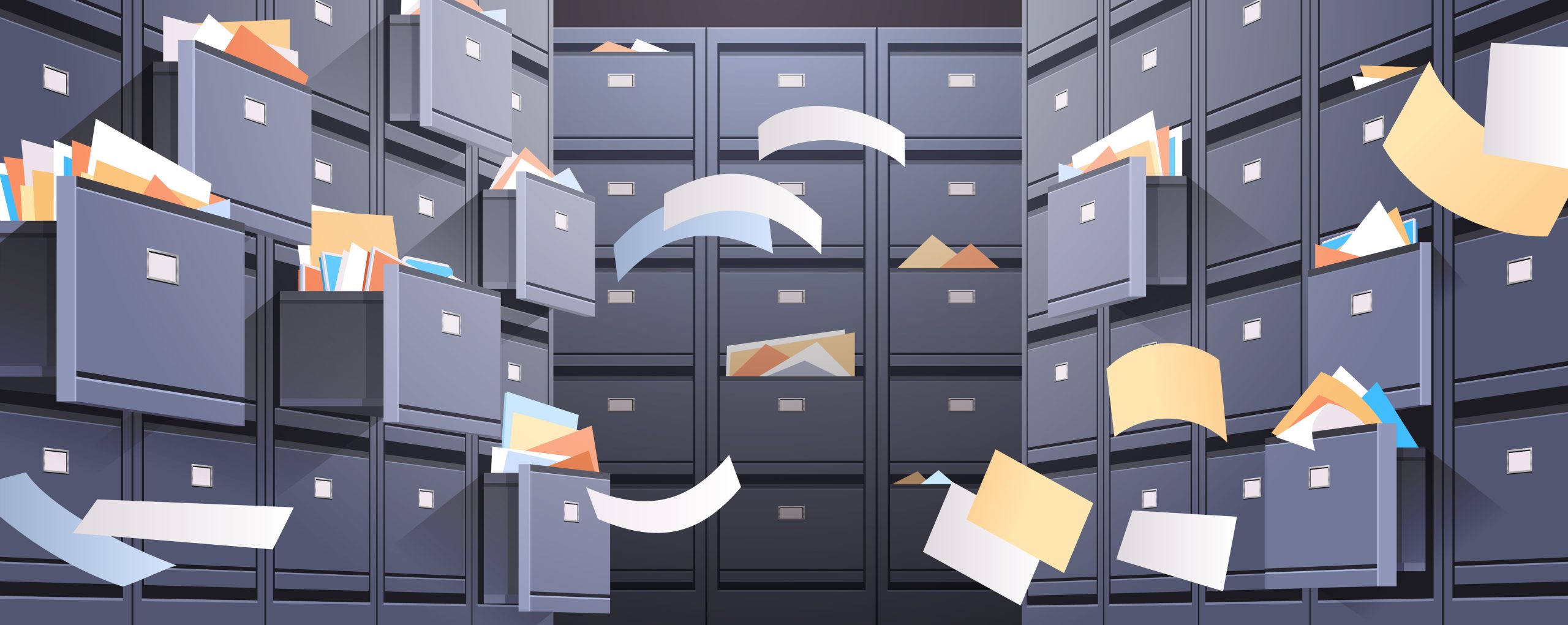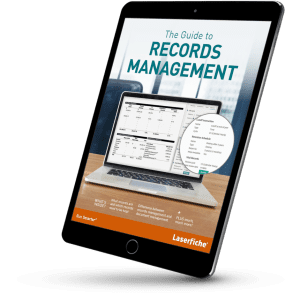Paper records are like your favourite old jumper—full of memories and full of holes. While one can understand nostalgia for clothing, emotional attachment to paper is quirky at best and disastrous at worst.
Here are 10 common excuses people use to hold on to paper-based records—and 10 reasons these excuses should be marked for disposition.

“We’ve always kept paper records”
Despite its flimsy logic, this excuse can be the hardest one to shake. For records managers, this sense of complacency leads to an exponential growth in paper, storage needs and cost. In fact, any excuse that begins with, “We’ve always…” should be thrown out of the records manager’s repertoire.
“I don’t trust computers”
We’ve all had that moment of panic when a computer malfunctions and we assess whether we’ve lost anything valuable. That moment is why man created external hard drives and cloud storage.

“Paper’s easy to use”
There’s no doubt that paper is an easy-to-use medium—but is it easy to manage? Relying on paper to store records is a classic case of doing the easy work today and leaving the hard work for tomorrow.
Every day a records manager puts off learning a more efficient system ends with another stack of paper, adding to the confusion and mess of a paper-based system.
“I know where everything is with paper”
A photographic memory is an admirable and useful quality—one I’m sure many records managers employ to remember the locations of paper documents. But here’s the problem with a memory-dependent records management system:
As paper grows, memory goes. Not to mention the fact that any disturbance to the records manager’s domain (a person takes a file without his/her consent, or a giant spider leaps at her face and makes her drop an armful of documents) becomes very difficult to repair.
“I like the feel of paper in my hands”
Some people simply love the tangible quality of paper, but do they also love the stinging quality of paper cuts?
If the records manager is a die-hard paper fan, then by all means they should keep using it—just not for storing records. Records managers should read Game of Thrones instead; they’ll have a book in their hands for eight months straight.
“Paper records aren’t that inconvenient”
The records department can feel like a dumping ground for unwanted documents. But in the event of a record request—or worse, an audit—that one file in a sea of thousands becomes absolutely critical.
The impact of an audit can be mitigated by easy access to company records. Electronically stored documents aren’t just more convenient than paper—they can reduce audit times and keep business moving across the entire organisation.

“I can control security more easily with paper records”
Protecting records from unauthorised employees is as easy as locking a file cabinet or storage room, right? Sure, if people never left their keys in a lock or forgot to set security alarms.
Electronic document management systems offer superior security in two ways. First, user-based access means employees must have the proper login credentials to view and use records. Second, records managers can use the system to track who views, or even attempts to view, an electronic record. They can snoop on the snoopers, so to speak.
“My records have been safe on paper for years; why change anything?”
Even if records managers think records are safe from prying eyes, they’re not safe from fires, floods or other disasters. Just imagine an evacuation scenario—would anyone be able to carry even one tenth of the paper records stored in a typical office?
Digitally storing records can reduce the impact of a natural or manmade disaster. Records managers should encourage their CEOs to develop disaster recovery plans for both active documents and archived records.
“Even if I switch to digital records, other departments will continue to give me paper”
Ideally, all departments would realise the time- and cost-saving benefits of digital documents. However, there are still efficient ways to convert paper documents to electronic files if the rest of the organisation doesn’t want to go digital.
Batch scanning, or scanning multiple pages and document types in a single session, is a great way to digitise records. These organisations have found creative and cost-efficient ways to scan sizeable backlogs.
“I’m worried my job will be replaced by a computer or robot”
A digital archive or electronic records management system still requires a records manager. Rather than replace the job of the records manager, these digital management systems enhance the capabilities of their human operators by:
- Making information more accessible.
- Tracking retention and disposition schedules.
- Keeping information safe and confidential with back-ups, user-based security and activity tracking.
Stop making excuses for paper records
Prepare your organisation for the future by implementing an Electronic Records Management solution! Get started today by downloading your copy of “The Ultimate Guide to Records Management.“



